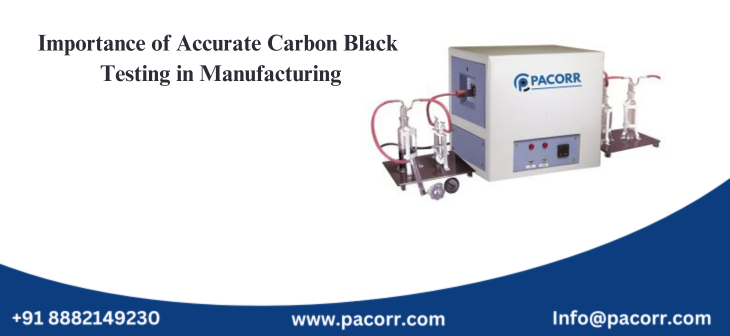
Carbon Black Content Tester has become essential in the modern manufacturing industry, especially in sectors that rely on plastic and polymer materials. Carbon black, a critical functional additive, enhances material strength, durability, and UV resistance, making it an indispensable component. However, its effectiveness is directly tied to precise composition, which is why accurate testing is crucial for maintaining quality standards.
This blog delves into the significance of carbon black, its testing methods, and the advanced tools used to measure its content. Whether you’re in the plastics, rubber, or construction industry, understanding carbon black analysis will help you ensure product quality, compliance, and performance.
What is Carbon Black and Why is it Important?
Carbon black is a fine, powder-like material made of elemental carbon. It is widely utilized as a reinforcing agent in applications like plastics, rubber, and coatings. When used in polymer-based products, it improves UV stability, enhances strength, and boosts resistance to external damage.
Why Test Carbon Black Content?
Testing the carbon black content in plastics or polymers is crucial for several reasons:
- Ensures Product Quality
- Accurate carbon black content improves material performance by enhancing its mechanical properties, UV resistance, and overall durability.
- Compliance with Industry Standards
- Standards such as ASTM D1603 mandate specific testing protocols for carbon black in polymers. Manufacturers must adhere to these guidelines to meet regulatory requirements.
- Cost-Effective Production
- Overuse of carbon black leads to unnecessary expenses, while insufficient quantities can compromise product quality. Testing ensures an optimal balance.
- Consistency in Manufacturing
- Testing helps maintain uniformity across production batches, ensuring consistent material performance.
By prioritizing carbon black testing, manufacturers can deliver high-quality products that meet industry standards while optimizing production efficiency.
ASTM D1603: The Gold Standard for Carbon Black Content Testing
The ASTM D1603 standard is one of the most widely used guidelines for determining carbon black content in polyethylene and other polymers. It outlines a gravimetric testing method based on thermal decomposition. This process provides accurate, repeatable results for analyzing the amount of carbon black in a sample.
Key Steps in ASTM D1603 Testing
Sample Preparation
A precise sample of the polymer is prepared according to the standard’s requirements, ensuring consistency in test results.
Thermal Decomposition
The polymer sample is heated in a controlled atmosphere, breaking down the material and isolating the carbon black as residue.
Weight Measurement
The residue left after the decomposition process is weighed to calculate the percentage of carbon black in the sample.
ASTM D1603 has become an essential tool for industries relying on polymers, offering a reliable and standardized approach to carbon black testing.
Testing Methods for Carbon Black Content
To ensure accurate results, manufacturers utilize a range of advanced techniques for carbon black content testing. Each method offers unique benefits depending on the application and type of material being tested.
1. Thermogravimetric Analysis (TGA)
This method involves heating a sample in a thermogravimetric analyzer to break down its components. The carbon black residue is measured to determine its content. TGA is a precise, reliable method that aligns with ASTM D1603 standards.
2. Carbon Black Dispersion Test
This test measures the uniformity of carbon black dispersion within a polymer matrix. Proper dispersion is essential for ensuring consistent material performance.
3. Gravimetric Analysis
A straightforward method where the polymer is heated in a muffle furnace to burn off all organic components, leaving only the carbon black residue. This residue is then weighed to calculate content.
4. Microscopy Analysis
High-resolution microscopes are used to visually evaluate the dispersion and distribution of carbon black particles in the material.
By combining these methods, manufacturers can achieve accurate insights into the carbon black content and ensure their products meet quality and performance requirements.
Advanced Carbon Black Analysis Equipment
High-quality testing requires specialized instruments capable of delivering precise and consistent results. Below are some essential Carbon Black Content Analysis Tools used in laboratories and industries:
1. Laboratory Carbon Black Content Analyzer
These instruments are specifically designed for accurate measurement of carbon black content in polymers. Equipped with advanced features, they ensure precise and repeatable results.
2. Thermogravimetric Analyzers (TGA)
TGA instruments are widely used for their precision in determining weight loss during thermal decomposition, making them ideal for ASTM D1603 testing.
3. Carbon Black Dispersion Test Equipment
This equipment is critical for measuring the dispersion of carbon black particles in polyethylene or other materials.
4. Muffle Furnaces
Essential for gravimetric analysis, muffle furnaces create the high-temperature conditions required to isolate carbon black residue.
5. Portable Carbon Black Content Tester
For field testing or quick analysis, portable testers offer a convenient and cost-effective solution, though they may lack the detailed results provided by laboratory-grade instruments.
Industries That Rely on Carbon Black Testing
Testing the content of carbon black is critical across various industries, including:
Plastics Manufacturing
Used to ensure polyethylene products like pipes, films, and containers have optimal UV resistance and mechanical strength.
Rubber Production
Carbon black enhances the tensile strength and wear resistance of rubber products, including tires and seals.
Automotive Industry
Components like tires, bumpers, and interior parts rely on accurate carbon black formulations for durability and performance.
Construction Materials
Pipes, cables, and geomembranes are made with carbon black to withstand harsh environmental conditions.
By employing advanced carbon black testing methods, these industries can consistently produce materials that meet stringent quality and performance standards.
How to Choose the Right Carbon Black Content Tester
Selecting the ideal Carbon Black Content Testing Equipment is crucial for achieving accurate results. Consider these factors:
Standard Compliance
Ensure the equipment meets standards such as ASTM D1603 for reliable and repeatable testing.
Accuracy and Repeatability
Look for tools that offer high precision and consistent results across multiple samples.
Ease of Use
User-friendly designs and automation features can significantly streamline testing processes.
Durability and Maintenance
Opt for equipment built to last and require minimal maintenance over time.
Technical Support
A trusted supplier should provide excellent after-sales support and assistance with calibration or troubleshooting.
Why Pacorr is the Right Partner for Carbon Black Testing Solutions
At Pacorr, we specialize in delivering advanced Carbon Black Content Testers tailored to meet the needs of modern manufacturers. Our instruments are designed for precision, durability, and compliance with ASTM standards, ensuring you achieve the highest level of product quality and consistency.
With years of expertise in manufacturing high-performance testing instruments, Pacorr provides reliable solutions for industries ranging from plastics to automotive and construction.
Carbon black content testing is vital for ensuring material quality, performance, and compliance with industry standards. By using advanced tools and adhering to standardized methods like ASTM D1603, manufacturers can produce superior products while optimizing production efficiency.
If you’re looking for accurate, reliable, and advanced Carbon Black Testing Equipment, Pacorr offers the best solutions to meet your needs. Explore our range of products at www.pacorr.com and stay ahead of the competition.
Thanks to Pacorr Testing instruments, we have all the required quality testing instruments that have helped us to ensure the best quality delivered to our clients.

Danish
Fair Exports Pvt. Ltd.

